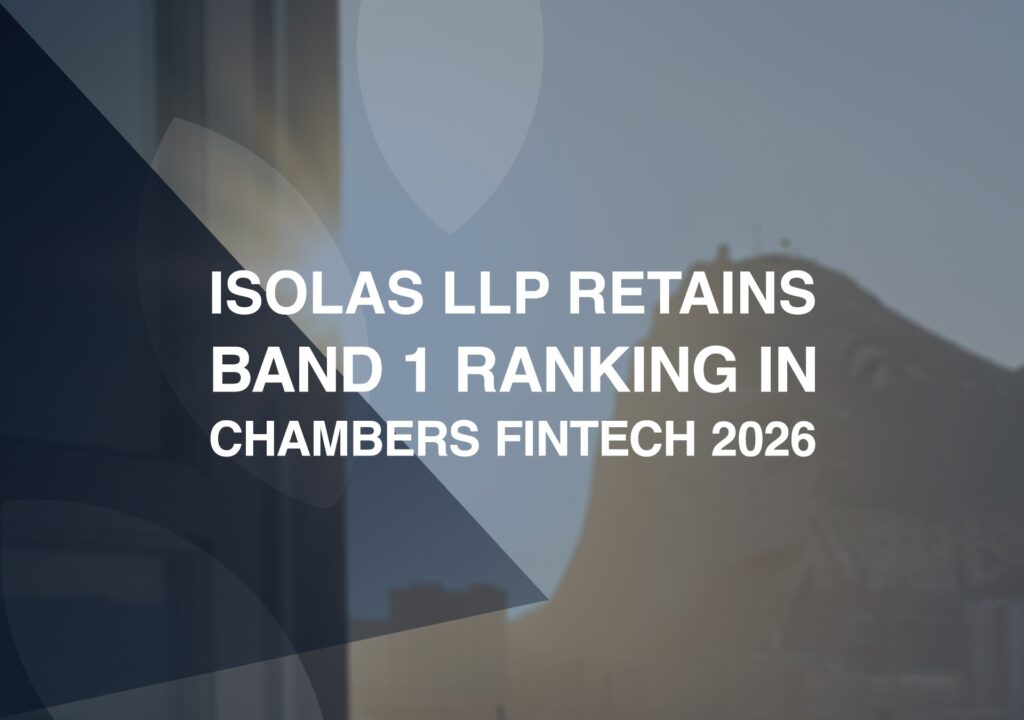Changes to the rules of cross-border law between Gibraltar and the UK and Gibraltar and Europe
In our increasingly interconnected world, cross-border law becomes more important every day. Gibraltarian companies are doing business on the international stage, with customers and partners from across Europe and beyond. As the law of each country and territory differs, it is vital to understand how these systems of law from different countries and territories interact. If a company based in France has a dispute arising from a contract it has with a Gibraltarian company, that company needs to know which country it can bring its claim in. This is then decided by the law on jurisdiction. If the French company then obtains a judgment from a French court against the Gibraltarian company, the key question then becomes how to make sure the Gibraltarian company complies with the French judgment. If all the assets of the Gibraltarian company are in Gibraltar, a French court may not have any control over them. That is where the law on recognition and enforcement of foreign judgments comes in.
The Civil Jurisdiction and Judgments (Amendment) Act 2025 came into effect on 7 November 2025. There are two key changes made by this new Act. Firstly, the processes have changed for the recognition and enforcement of foreign European and UK judgments in Gibraltar. Secondly, there have been changes to the rules for determining whether, in cross-border cases spanning Gibraltar and another European country or Gibraltar and the UK, a Gibraltarian court has jurisdiction to deal with the case. These changes mean that it may be harder, or in some cases no longer possible for foreign European judgments to be enforced in Gibraltar, and that Gibraltarian courts may have more jurisdiction to rule on cases which might otherwise have fallen within the jurisdiction of another European country.
This article is the first of a two-part series. This article will highlight what has changed in the rules on jurisdiction, recognition and enforcement under Gibraltarian law, and the second part will drill down into the impact of these changes on cases which are already in progress, together with looking ahead to future changes in the law in this area.
Gibraltarian law in this area was largely dominated by EU law. As Gibraltar was a member of the EU by virtue of the UK’s membership, Gibraltar left the EU at the same time as the UK, on 31 January 2020. Following a transitional period, most of EU law which applied in Gibraltar on 31 December 2020 was incorporated into Gibraltarian law. Following Brexit, therefore, Gibraltar is now free to amend or repeal EU-derived law, such as the law on jurisdiction and the recognition and enforcement of foreign judgments in Gibraltar.
Recognition or enforcement?
Recognition and enforcement of a judgment are slightly different, though related concepts.
Recognition involves a Gibraltarian court treating the issues decided by a foreign court as having been conclusively determined between the parties to a legal case for the purposes of Gibraltarian law. A person may use recognition of a foreign judgment to resist a claim brought in Gibraltar, for example on the grounds that the claim being brought against them has already been decided by a foreign court.
Enforcement, on the other hand, is the process by which a person ensures that a judgment that they have obtained by a foreign court is carried out in Gibraltar. Importantly, a judgment can only be enforced in Gibraltar if it has first been recognised under Gibraltarian law.
The Civil Jurisdiction and Judgments (Amendment) Act 2025
The law on jurisdiction and recognition and enforcement of foreign judgments in Gibraltar is multi-faceted, with many different regimes having arisen over the years. The Civil Jurisdiction and Judgments Act 1993 only relates to some of the methods for determining jurisdiction and recognising and enforcing foreign judgments in Gibraltar, though it is nevertheless a key piece of legislation in this area. This key piece of legislation has now seen sweeping changes with the Civil Jurisdiction and Judgments (Amendment) Act 2025.
In brief, the Lugano Convention, the Brussels Conventions and Regulation 1215/2012 (known as the Brussels Recast Regulation) no longer have effect in Gibraltarian law. In parallel, however, procedures very similar to those of the 1968 Brussels Convention have been enacted to regulate the jurisdiction of civil claims between Gibraltar and the UK and allow for the continued recognition and enforcement of UK judgments in Gibraltar.
The Lugano Convention was relevant in Gibraltar for determining jurisdiction in civil and commercial matters between Gibraltar and Norway, Iceland and Switzerland. The Lugano Convention also provided for the recognition and enforcement of judgments in civil and commercial matters from Norway, Iceland and Switzerland in Gibraltar. It is noted that Norway, Iceland and Switzerland, together with Liechtenstein, form the European Free Trade Association, or EFTA.
The Brussels Conventions (the first of which dates from 1968), as subsequently amended, laid down rules about determining jurisdiction in civil and commercial matters between Gibraltar and EU member states (including the UK). The Brussels Conventions also allowed for judgments from any EU member state to be recognised and enforced in Gibraltar. While Gibraltar was within the EU, the Brussels Conventions were almost entirely replaced by the Brussels Recast Regulation.
These rules for determining jurisdiction and regimes for recognition and enforcement of judgments from EU and certain EFTA countries have now, however, been swept away by the Civil Jurisdiction and Judgments (Amendment) Act 2025.
Not all change
The 2005 Hague Convention continues to have effect in Gibraltarian law under the Civil Jurisdiction and Judgments Act 1993. This Convention provides for determining jurisdiction between certain countries (including all EU member states) and Gibraltar, and the recognition and enforcement of judgments from certain countries (including all EU member states) in civil and commercial matters where there is an agreement between the parties involved for any disputes to be decided only by the courts of a jurisdiction which is a party to the 2005 Hague Convention. The 2005 Hague Convention is therefore only relevant in cases about a contract between parties in which the parties have agreed which country claims in respect of the contract have to be brought in. The provisions relating to the 2005 Hague Convention in the Civil Jurisdiction and Judgments Act 1993 remain unaltered by the Civil Jurisdiction and Judgments (Amendment) Act 2025.
Similarly, the 2007 Hague Convention, which relates to certain family law matters with a cross-border element, continues to have effect in Gibraltarian law. The provisions in the Civil Jurisdiction and Judgments Act 1993 in respect to this Convention also remain unchanged by the Civil Jurisdiction and Judgments (Amendment) Act 2025.
New procedures for determining jurisdiction, recognition and enforcement
Recognition and enforcement of judgments from an EU member state, Norway, Iceland or Switzerland in Gibraltar may still be possible, but must now instead proceed under a different procedure under Gibraltarian law, such as the 2005 Hague Convention mentioned above (if applicable), or the common law procedure, which is the default mechanism for enforcement and recognition of foreign judgments in Gibraltar where no other treaty applies.
However, use of these different procedures to recognise and enforce judgments in Gibraltar, rather than the Brussels Conventions, the Lugano Convention or the Brussels Recast Regulation may mean that less types of judgments from EU member states, Norway, Iceland and Switzerland may be enforced in Gibraltar, and that a greater range of defences against the enforcement of such judgments may be available.
For determining whether the courts of Gibraltar or those of Norway, Iceland, Switzerland or an EU member state should have jurisdiction to decide a legal case, similarly, now that the Brussels Conventions, the Lugano Convention and the Brussels Recast Regulation no longer apply in Gibraltarian law, a different procedure must be used. This may be the 2005 Hague Convention or common law rules. However, in evaluating whether the courts of Gibraltar or another European country should have jurisdiction to decide a dispute with international elements, using these different procedures may actually make it easier than it was under the Lugano Convention, the Brussels Conventions or the Brussels Recast Regulation for a person to establish under Gibraltarian law that the courts of Gibraltar have jurisdiction to decide the claim.
The procedure that will now be applicable for enforcement of UK judgments in Gibraltar is contained in the new Part V of the Civil Jurisdiction and Judgments Act 1993 and is based upon the procedures in the 1968 Brussels Convention, as amended. One notable difference under this procedure compared to the previous rules is that UK judgments must first be registered with the Supreme Court of Gibraltar before being enforceable in Gibraltar. This registration process was not required when the Brussels Recast Regulation applied in Gibraltarian law.
Likewise, the procedure now applicable in Gibraltarian law for determining whether the courts of the UK or Gibraltar should have jurisdiction in a legal case is now governed by procedures based on the Brussels Conventions and not by the Brussels Recast Regulation. While these procedures are largely similar, there are differences and nuances between them. For example, there are special rules in both the Brussels Conventions and the Brussels Recast Regulation requiring certain claims involving consumers to be brought in the country where the consumer is domiciled. However, the rules about jurisdiction in claims involving consumers in the Brussels Recast Regulation covers more types of consumers than the rules in the Brussels Conventions. Therefore, by moving away from the Brussels Recast Regulation to the Brussels Conventions procedure for determining jurisdiction between Gibraltar and the UK, it may be easier under Gibraltarian law for a consumer to sue or be sued in a country other than his or her home country.
What happens next?
In part two, we will examine in detail the transition from the old rules on jurisdiction and recognition and enforcement of judgments to the new rules and the impact on cases currently in progress. We will also look forward to what is coming next, including the impact of the upcoming application of the 2019 Hague Convention in Gibraltar law under the Recognition and Enforcement of Judgments (2019 Hague Convention etc.) Regulations 2025, published on 13 November 2025.
As Gibraltar’s relationship with the EU continues to evolve, reliable advice on the law is more important than ever. ISOLAS LLP, your trusted advisor since 1892, can help you cut through the noise and confusion of the post-Brexit landscape to give you confidence and clarity in your cross-border transactions or disputes. Get in touch here.






